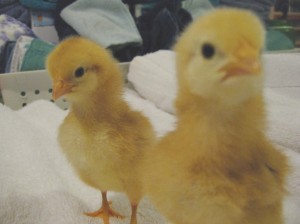 Spring is in the air. Time for the birds and the bees to be up and about again. But if you’re a local “chicken parent” like Freya Hainley of North Smithfield, you won’t have to wait for the Bunny to bring you eggs this year. Welcome to the world of backyard chicken keeping, a truly local, and environmentally friendly trend.
Spring is in the air. Time for the birds and the bees to be up and about again. But if you’re a local “chicken parent” like Freya Hainley of North Smithfield, you won’t have to wait for the Bunny to bring you eggs this year. Welcome to the world of backyard chicken keeping, a truly local, and environmentally friendly trend.
Hainley started raising her “mother cluckers” after her former egg supplier moved; when she switched to store bought eggs, her family accused her of making rotten egg omelets, such was the difference in taste. The hefty price tag of organic, free range eggs annoyed her. “You shouldn’t have to pay for something that is less work – it’s very unfair.” So two years, ago she hatched a plan and bought her own flock – currently one Rhode Island Red and two Red Stars from mypetchicken.com.
Mature chickens lay approximately one egg per day, providing Hainley with plenty of “friendship currency” – fresh eggs with golden orange yokes that can make you very popular. “There really is a difference,” she says. Fresh, organic eggs produce scrambled eggs that are more “custardy”. “Store eggs might be three weeks old – you can smell the ammonia when you use them.”
But Hainley clearly gets more than just food from the birds. “They are like free entertainment. They are always doing these amazing little antics and then you get the bonus of having breakfast from these sweet little creatures,” she says. She finds it rewarding for her kids as well. “It’s made a big impact in our lives. There’s nothing nicer than watching your kids reach for an egg as a snack after school rather than junk food.”
And she says, her kids had an understanding of where their food comes from at an early age. Chickens will lay for about four years, after which, due to medical issues, it’s more humane to put them down. “We treat our chickens well until the day they get brought to the butcher,” but even then nothing is wasted, as Hainley makes good use of the whole bird, from the feathers on in.
Home chickens are also an environmental boon. They improve the soil, eat the protein food scraps that can’t be composted, and naturally help control the tick population in the backyard. “Our garden has definitely gotten more perky after the chickens,” Hainley laughs. And they are space efficient, too, requiring only two square feet per bird, although Hainley has deluxe accommodations for her flock with a 10’x5’ run attached to their coop.
Before you fly out to buy your own chicks, Hainley says it’s important to check your local laws to make sure you don’t run into problems, and to communicate with your neighbors. “There are a lot of misconceptions about chickens – [people] think they are dirty and noisy and they are neither.” It’s also important to research different breeds to ensure that you and your chickens will be happy with the conditions available. Her favorite book, Chick Days: An Absolute Beginner’s Guide to Raising Chickens from Hatching to Laying Jenna Woginrich, is great for kids and adults. The chicken breeders, too, will be able to help you select the best breeds for your flock.
Now you won’t even need the Easter Bunny to hide those eggs!
Food